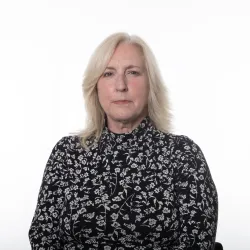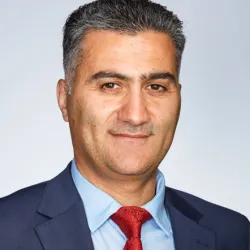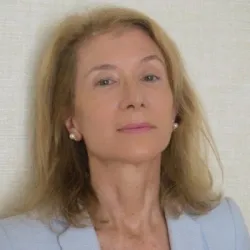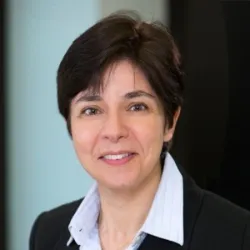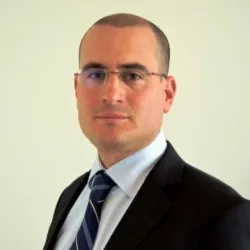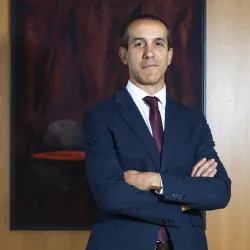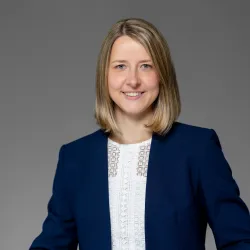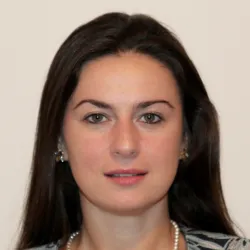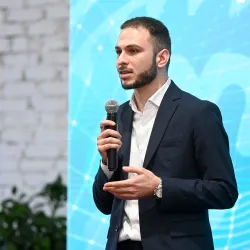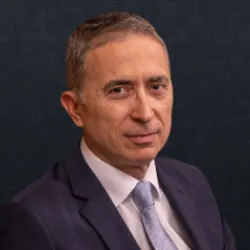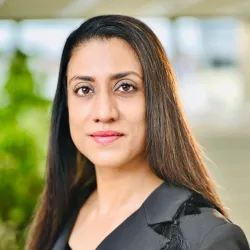London Training Series
London Training Series

London Training Week
Date: May 19 - May 23, 2025
Time: 9am-5pm
Location: London, United Kingdom
Group discount: 4 people for the price of 3
Topics covered
| Leadership | Fintech | Currency | Balance sheets | Financial stability | AI & automation | DLT & Blockchain
Presenters include
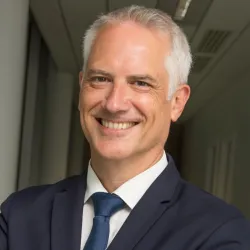
Laurent Clerc
Deputy director for general statistics, economics and international
Bank of France

John Fell
Deputy director general, macro-prudential policy and financial stability
European Central Bank
John Fell is Deputy Director General for Macroprudential Policy & Financial Stability in the ECB. He is also the chair or co-chair of several international working groups - including the Eurosystem’s Macroprudential Policy Group (MPPG), the European Systemic Risk Board’s (ESRB) Instrument Working Group (IWG), and the ESRB’s task force on stress-testing. He is a member of the ECB’s Financial Stability Committee (FSC), the ESRB’s Advisory Technical Committee (ATC), and the Financial Stability Board’s Standing Committee on Assessing Vulnerabilities (SCAV). He led the stress-testing work for the ECB’s “comprehensive assessment” in 2014 as well as EU-wide banking sector stress-tests coordinated by the Committee of European Banking Supervisors (CEBS) (2009, 2010) and the European Banking Authority (EBA) (2011, 2014). His crisis management experience is extensive, including negotiating EU/IMF financial assistance programs in several euro area countries (e.g. in Ireland, Portugal and Spain). Between 2003 and 2010, he was Head of the ECB’s Financial Stability Division, spearheading the inaugural issue of the ECB’s Financial Stability Review in 2004 and directing it thereafter. Before moving to the financial stability area in 2003, he was an Adviser in the ECB’s Monetary Policy Directorate. Prior to joining the ECB in 1998, as a principal economist, he held various positions at the European Monetary Institute (EMI) and the Central Bank of Ireland. John holds postgraduate degrees in Economics (1987) and in Finance (1993) from University College Dublin and Dublin City University respectively, and is a PhD candidate at the Rotterdam School of Management, Erasmus University. He has published his research in several academic and policy journals.

Ed Dew
Senior manager for wholesale cash oversight
Bank of England
Ed Dew is a Senior Manager at the Bank of England, responsible for Wholesale Cash Oversight. He has been at the Bank of England for over 20 years, holding Senior Manager positions in Banknote Analysis, as well as Operational Risk and Resilience, prior to his current role. Before joining the Bank of England, Ed earned an MSc in Economics from the University of Southampton.

David Brinkman
Principal legal counsel
European Central Bank
David Brinkman is a principal legal counsel in the DG Legal Services of the European Central Bank, in the Supervisory Law Division. David advises on banking supervision issues with a focus on climate-related risk as well as innovation and artificial intelligence. David is part of the Legal Services TechGroup and has a coordinating role regarding digitalisation. Before his time at the ECB, David has worked as an attorney-at-law in a large Dutch law firm. He has been an in house-counsel for a listed bank insurance conglomerate and has worked as a supervisor for the Dutch Central Bank, in the Market Access Department. David holds a master’s degree in law from the University of Amsterdam.
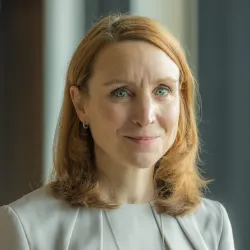
Alexandra Hachmeister
Deutsche Bundesbank
Director general of the Digital Euro
Dr Alexandra Hachmeister is currently heading the General Directorate for the Digital Euro at Deutsche Bundesbank. She joined Bundesbank in 2022 where she headed up the Directorate General for Economic Education, University and International Central Bank Dialogue. Alexandra held various top management positions at Deutsche Börse AG, including Chief Regulatory Officer and Managing Director for Market Data & Services. Alexandra Hachmeister holds a doctorate in Market Microstructure.

What's on the agenda?
London - 19th May
13:30 – 13:45
Delegate registration
13:30 - 13:45
13:45 – 14:00
Welcome to Central Banking's London training week
13:45 - 14:00
Michelle Godwin is responsible for all Central Banking Institute memberships and subscriptions with central banks worldwide. She and her global team serve clients in more than 130 countries. Michelle joined Central Banking in 2007 and has a wealth of experience and has built fantastic relationships with the central banking community globally.
14:00 – 15:00
Leadership & mental resilience in central banking: The key to a thriving workforce
14:00 - 15:00
- Key mental health data for Banking Employees that is causing many to invest in mental performance across the workforce
- How investing in mental performance drives better staff retention, sickness absence levels and productivity under pressure
- How leaders and managers can support their diverse range of employees including those who are Neurodiverse
- How leaders can drive your organisation to be at the forefront of the industry being recognised as the best place to work
- Practical exercises and techniques to enhance your resilience across all aspects of your life, including self-assessment tools, mindfulness practices, and stress management strategies
Joel Gujral is 31 years old and the Founder & CEO of a mental health company MYNDUP. Joel founded the company in April 2019 after his own mental health battle due to an undiagnosed gut condition and he struggled to access support when working at a global finance company that offered counselling. He then set up MYNDUP to stop the one size fits all approach to mental health and also change the way organisations were dealing with this by removing all barriers to care.
Joel bootstrapped the company with £105 and then subsequently raised £5m. MYNDUP is now servicing employees in 50 countries with brands like Monzo, Dentons, Savills, CVC & The Princes Trust.
Joel has won several awards during his entrepreneurial journey including:
- Winner of the Barclays Start-up Entrepreneur of the Year Award
- Winner of the London Stock Exchange Group Entrepreneurship Programme
- Top 100 Asian Stars in UK Tech 2023 listed as a top 5 UK startup
15:00 – 16:00
Evolving central bank communications: Engaging the next generation
15:00 - 16:00
Sian Jones, Head of Communications Content & Strategy, will discuss how the Bank of England is reimagining their external communications to build trust and financial literacy among younger audiences. This session will examine data-driven strategies, innovative partnerships, and targeted campaigns designed to connect with underrepresented groups and foster greater public engagement. From leveraging social media to collaborating with influencers, discover how institutions are making financial topics more accessible and relatable.
I'm Sian Jones and I'm a senior leader at the Bank of England, where I’ve worked for ten years. I've also worked in senior roles in central government, regulatory bodies and the third sector, focusing on delivering award winning internal and external communications and leading change management and engagement programmes. In my current role, I advise the Governor and Board of Directors on external communications and colleague engagement and am leading work on transforming the way we communicate through digital channels. Outside work, I serve my community by sitting as a presiding justice sitting on the East London magistrates bench.
16:00 – 18:00
Afternoon tea and networking
16:00 - 18:00
London - 20th May
Innovating with Fintech, Regtech and Suptech: Enhancing inclusion and regulatory efficiency
08:00 – 09:00
Arrival, coffee and networking
08:00 - 09:00
09:00 – 09:45
Chair introduction & ice breaker
09:00 - 09:45
- Interactive introductions to set the stage for collaboration
- Overview of the day’s objectives and themes
Komitas Stepanyan is a seasoned professional with over 20 years of experience, specializing in technology, information, and cybersecurity. Currently serving as the Director for Technology, Information, and Cybersecurity at the Central Bank, he plays a pivotal role in driving digital transformation initiatives both within the institution and at a national level.
With a background spanning more than 13 years in the Internal Audit department, Komitas has held various leadership positions, including deputy chief audit executive and head of the IT audit division. He possesses extensive knowledge and expertise in international best practices and standards such as ISO27001 series, ISO 22301, COBIT, COSO ERM, NIST cybersecurity framework, and FFIEC cybersecurity maturity model.
His expertise extends to collaborating with the IMF and the World Bank as an expert in IT/Info/cyber governance, risk management, regulation and supervision, and public sector GovTech activities and digital transformation.
Komitas is actively engaged in international programs and forums, having presented at numerous events across the USA, Europe, Middle East, Asia, Africa, and post-Soviet countries. He also shares his knowledge and expertise as an adjunct professor at the American University of Armenia and French University of Armenia.
Komitas holds a PhD degree in applied physics and is certified in CRMA, CRISC, and COBIT.
09:45 – 10:45
Regulatory sandboxes
13:30 - 14:45
- Presentation on the purpose, benefits, and challenges of regulatory sandboxes
- Real-world examples of sandbox implementation by central banks
- Open discussion on lessons learned and best practices
Dave Tighe is an experienced professional in regulation, fintech, and banking. Currently serving as the Innovation Strategy Manager at Central Bank of Ireland. As a member of the Innovation Strategy and Policy Team, Dave has been responsible for the development of the Innovation Hub and Innovation Sandbox Programmes for the Central Bank of Ireland. Previously, David held various roles at KPMG Ireland in management consulting and spent a significant tenure at Bank of Ireland, where responsibilities included Director of CX and Innovation, Head of Enterprise and Innovation, and multiple product management positions in retail banking. David's educational background includes a Chartered Banker degree from IOB, MBA from Manchester Business School and English degree from Trinity College Dublin.
10:45 – 11:15
Networking break
11:00 - 11:30
11:15 – 12:30
Regulating fintech innovation: The case of FinTechX
11:30 - 12:30
FinTechX is a rapidly growing fintech start-up that provides AI-driven lending, cross-border payments, and cryptocurrency-based remittances. It operates in multiple jurisdictions and has gained popularity for its low-cost, fast, and data-driven financial services. However, regulators have raised concerns about consumer protection, financial stability, AML/CFT risks, and compliance with existing laws.
From this brief workshop and review:
- AI and consumer protection
- AML and cryptocurrency compliance
- Cross-border regulation
- Regulatory Innovation
Komitas Stepanyan is a seasoned professional with over 20 years of experience, specializing in technology, information, and cybersecurity. Currently serving as the Director for Technology, Information, and Cybersecurity at the Central Bank, he plays a pivotal role in driving digital transformation initiatives both within the institution and at a national level.
With a background spanning more than 13 years in the Internal Audit department, Komitas has held various leadership positions, including deputy chief audit executive and head of the IT audit division. He possesses extensive knowledge and expertise in international best practices and standards such as ISO27001 series, ISO 22301, COBIT, COSO ERM, NIST cybersecurity framework, and FFIEC cybersecurity maturity model.
His expertise extends to collaborating with the IMF and the World Bank as an expert in IT/Info/cyber governance, risk management, regulation and supervision, and public sector GovTech activities and digital transformation.
Komitas is actively engaged in international programs and forums, having presented at numerous events across the USA, Europe, Middle East, Asia, Africa, and post-Soviet countries. He also shares his knowledge and expertise as an adjunct professor at the American University of Armenia and French University of Armenia.
Komitas holds a PhD degree in applied physics and is certified in CRMA, CRISC, and COBIT.
12:30 – 13:30
Lunch break & networking
12:30 - 13:30
13:30 – 14:30
Regtech and Suptech – transforming compliance and supervision
15:00 - 16:00
- Insights into Regtech tools for streamlining compliance and improving accuracy
- Discussion on Suptech’s role in proactive supervision and risk management
Komitas Stepanyan is a seasoned professional with over 20 years of experience, specializing in technology, information, and cybersecurity. Currently serving as the Director for Technology, Information, and Cybersecurity at the Central Bank, he plays a pivotal role in driving digital transformation initiatives both within the institution and at a national level.
With a background spanning more than 13 years in the Internal Audit department, Komitas has held various leadership positions, including deputy chief audit executive and head of the IT audit division. He possesses extensive knowledge and expertise in international best practices and standards such as ISO27001 series, ISO 22301, COBIT, COSO ERM, NIST cybersecurity framework, and FFIEC cybersecurity maturity model.
His expertise extends to collaborating with the IMF and the World Bank as an expert in IT/Info/cyber governance, risk management, regulation and supervision, and public sector GovTech activities and digital transformation.
Komitas is actively engaged in international programs and forums, having presented at numerous events across the USA, Europe, Middle East, Asia, Africa, and post-Soviet countries. He also shares his knowledge and expertise as an adjunct professor at the American University of Armenia and French University of Armenia.
Komitas holds a PhD degree in applied physics and is certified in CRMA, CRISC, and COBIT.
14:30 – 15:00
Quick coffee break
14:45 - 15:00
15:00 – 16:00
Workshop: Solutions for regulatory efficiency
16:00 - 17:00
- Group activity reflecting on key learnings from the day
- Collaborative brainstorming on actionable solutions for improving regulatory efficiency using Regtech and Suptech
I am someone who spent the first half of his professional life at banks’ internal audit, Operational/Cyber Risk and Compliance domains. In the second half of my professional life, I re-invented and developed myself towards a FinTech innovator and change facilitator.
Prior to joining the National Bank of Georgia (NBG) where my focus is a Countrywide FinTech, Open Finance strategy and regulatory design, I held senior positions at banks in Georgia and in Ukraine, and served on the management board of a leading retail bank (Liberty) in Georgia.
I am passionate about the Strategic Transformation of Central Bank to “Fit” the new paradigm of Open Finance.
Master’s degree from London Business School (LBS) specialized in Strategy and Leadership, combined with the domain experience allows me to see and suggest the efficient digitization strategies through industry development lenses.
Most recently, my team and I came up with the concept of “FinTech in Georgia; building on the Middle Corridor Momentum".
16:00 – 16:30
Central Banking presents: Benchmarking live
16:00 - 16:30
Review the latest data and industry trends on a wide array of topics from Central Banking’s benchmarking division.
Daniel Hinge is editor of Central Banking’s benchmarking service and subject specialist for economics and monetary policy. He has reported on the central banking community since 2012, in roles including news editor and comment editor. He holds a degree in politics, philosophy and economics from the University of Oxford.
Securing financial stability in a shifting global landscape
08:00 – 09:00
Arrival, coffee and networking
08:00 - 09:00
09:00 – 09:30
Chair introduction & macro-overview
09:00 - 09:30
María J. Nieto (PhD) is a Visiting Senior Fellow at the London School of Economics (Grantham Research Institute), Member of EBI and former Senior Advisor at Bank of Spain. She is author of numerous peer-reviewed articles (Journal of Banking and Finance, Journal of Financial Stability, Journal of International Financial Markets, Institutions and Money among others). She has cooperated as advisor with the International Monetary Fund and the Federal Reserve Bank of Atlanta for over 10 years and she serves on the advisory boards of the Journal of Financial Regulation and Compliance, the Journal of Financial Regulation, the Central Banking Training Advisory Board (UK) and the Institute of International Monetary Economics (UK). She has a PhD from University Complutense de Madrid, an MBA in finance from the University of California, Los Angeles (UCLA), and is a Certified Public Accountant (CPA)
09:30 – 10:30
Financial stability in an uncertain world
09:30 - 10:30
- Geopolitical risks and its effect on financial stability
- ECB’s stance on securing robust financial stability given current challenges
- Navigating through key challenges like cyber risk
John Fell
Deputy director general, macro-prudential policy and financial stability
European Central Bank
John Fell is Deputy Director General for Macroprudential Policy & Financial Stability in the ECB. He is also the chair or co-chair of several international working groups - including the Eurosystem’s Macroprudential Policy Group (MPPG), the European Systemic Risk Board’s (ESRB) Instrument Working Group (IWG), and the ESRB’s task force on stress-testing. He is a member of the ECB’s Financial Stability Committee (FSC), the ESRB’s Advisory Technical Committee (ATC), and the Financial Stability Board’s Standing Committee on Assessing Vulnerabilities (SCAV). He led the stress-testing work for the ECB’s “comprehensive assessment” in 2014 as well as EU-wide banking sector stress-tests coordinated by the Committee of European Banking Supervisors (CEBS) (2009, 2010) and the European Banking Authority (EBA) (2011, 2014). His crisis management experience is extensive, including negotiating EU/IMF financial assistance programs in several euro area countries (e.g. in Ireland, Portugal and Spain). Between 2003 and 2010, he was Head of the ECB’s Financial Stability Division, spearheading the inaugural issue of the ECB’s Financial Stability Review in 2004 and directing it thereafter. Before moving to the financial stability area in 2003, he was an Adviser in the ECB’s Monetary Policy Directorate. Prior to joining the ECB in 1998, as a principal economist, he held various positions at the European Monetary Institute (EMI) and the Central Bank of Ireland. John holds postgraduate degrees in Economics (1987) and in Finance (1993) from University College Dublin and Dublin City University respectively, and is a PhD candidate at the Rotterdam School of Management, Erasmus University. He has published his research in several academic and policy journals.
10:30 – 11:00
Coffee break
11:45 - 12:00
11:00 – 12:00
South Africa’s recent financial stability assessment
11:00 - 12:00
- Discussing South African Reserve Bank’s (SARB) latest financial stability report
- Key findings, assessments and outcomes
- SARB’s role in mitigating climate risk and ensuring financial stability
Dr Nicola Brink is the Head of the Financial Stability Department of the South African Reserve Bank (SARB). She has extensive central banking experience, having spent her career in several departments of the SARB, including the Economic Research Department, the Bank Supervision Department (now the Prudential Authority), and the Financial Markets Department. In recent years, she played a key role in the process to bring South Africa’s resolution framework for failing financial institutions in line with international standards. She represents the SARB in various external and international committees, including the Financial Stability Board’s Resolution Steering Group and Assessment of Global Vulnerabilities Group. Her qualifications include an Honours Degree in Communication Science, a PhD in Economics and an MBA degree (cum laude). She has published a number of domestic and international research papers, mainly focusing on the management of market liquidity by the central bank through its operations, both in normal and crisis times.
12:00 – 12:30
Climate mitigation scenarios and supporting models
12:00 - 12:30
- Different models used to respond to economic questions around climate "transition" risks
- The concept of climate scenario
- Climate scenario providers
María J. Nieto (PhD) is a Visiting Senior Fellow at the London School of Economics (Grantham Research Institute), Member of EBI and former Senior Advisor at Bank of Spain. She is author of numerous peer-reviewed articles (Journal of Banking and Finance, Journal of Financial Stability, Journal of International Financial Markets, Institutions and Money among others). She has cooperated as advisor with the International Monetary Fund and the Federal Reserve Bank of Atlanta for over 10 years and she serves on the advisory boards of the Journal of Financial Regulation and Compliance, the Journal of Financial Regulation, the Central Banking Training Advisory Board (UK) and the Institute of International Monetary Economics (UK). She has a PhD from University Complutense de Madrid, an MBA in finance from the University of California, Los Angeles (UCLA), and is a Certified Public Accountant (CPA)
12:30 – 13:30
Lunch break & networking
12:30 - 13:30
13:30 – 15:00
How to conduct stress-tests to mitigate climate risks and ensure financial stability
13:30 - 15:15
- Running climate stress tests to collect data and understand financial institutions exposure to climate risk
- Testing their ability to manage and mitigate risk
- The Bank of France is the first central bank to conduct a climate stress test on its financial sector – key finding and sharing
15:00 – 15:15
Coffee break
12:45 - 13:00
15:15 – 16:00
State of Transition in Sovereigns 2024: Tracking national climate action
15:45 - 16:30
- This session will present the Assessing Sovereign Climate-related Opportunities and Risks (ASCOR) project, designed to allow investors to track national climate action and for countries to showcase progress
- It will show how sovereigns are evaluated across three pillars and how the assessment framework has been constructed to avoid a country income bias
- Using real country examples, it will discuss learnings for national governments to address information gaps identified by investors, and how sovereigns can improve disclosure and engagement to make their ‘National Determined Contributions’ investable.
Carmen Nuzzo
Professor in practice & executive director
London School of Economics & Political Science (LSE)
Carmen Nuzzo, Professor in Practice, Executive Director, Transition Pathway Initiative Centre (TPI Centre), London School of Economics and Political Science (LSE)
Carmen leads on setting and delivering the strategy of the TPI Centre - part of the Grantham Research Institute on Climate Change and the Environment at the London School of Economics - as well as overseeing its research and operations. The Centre is the academic partner of TPI, a global investor initiative, led by asset owners and supported by asset managers. It offers independent, rigorous research and open-access data on corporate, bank and sovereign entities, to assess the progress that they are making in the transition to a low-carbon economy. Carmen sits on the management committee of the LSE’s Global School of Sustainability and is a member of the LSE’s ESG investment policy review.
Prior to joining the TPI Centre in 2023, Carmen was Head of Fixed Income, at the UN-Principles for Responsible Investment (PRI), where she was responsible for sovereign, sub-sovereign, securitised products and private debt workstreams, as well as leading on the ESG in credit risk and ratings initiative, a PRI’s flagship programme. Since 2014, her primary focus has been on sustainable economics and finance, building on her long-standing experience in economic and market analysis research, starting in 1993 at Salomon Brothers, with subsequent roles at Citigroup, ShareAction and Morgan Stanley. She is currently part of the UK Transition Finance Council, co-launched by the City of London and HM Government, and serves as an Observer to the Principles of the International Capital Market Association
16:00 – 16:30
Central Banking presents: Benchmarking live
16:00 - 16:30
Review the latest data and industry trends on a wide array of topics from Central Banking’s benchmarking division.
Daniel Hinge is editor of Central Banking’s benchmarking service and subject specialist for economics and monetary policy. He has reported on the central banking community since 2012, in roles including news editor and comment editor. He holds a degree in politics, philosophy and economics from the University of Oxford.
London - 21st May
AI and automation: Leveraging data and managing risks
08:00 – 09:00
Arrival, coffee and networking
08:00 - 09:00
09:00 – 09:30
Chair introduction & ice breaker
09:00 - 09:45
- Participants share their experience or interest in AI and automation
- Overview of the day’s themes and objectives
I am deputy head of Finance & Strategy and heading the Strategic planning, organization and Innovation management units within the National Bank of Belgium. Prior joinging the National Bank of Belgium in 2018, I worked 8 years at EY managing major transformation within the Financial Sector. Prior to that I worked for the United Nations in Mozambique (2010-2011) Accenture Consulting (4 years). I used to start in the Belgium army as Officer. My education: Master in International Relations, specialized in Ethnic Conflict resolution (University of Brussels & University of London) and Master in Business (Solvay Business School in Brussels).
09:30 – 11:00
Exploring the 7 Types of AI risks and possible opportunities
09:30 - 11:00
- Presentation on the key risks associated with AI in financial systems (e.g., workforce displacement, confidentiality of data) and their opportunities
- Workshop with the delegates on examples of these risks arising at their central banks and how to cope with them
- Feedback session and interactive discussion on how these individual examples of risks and opportunities could be managed (takeaways)
I am deputy head of Finance & Strategy and heading the Strategic planning, organization and Innovation management units within the National Bank of Belgium. Prior joinging the National Bank of Belgium in 2018, I worked 8 years at EY managing major transformation within the Financial Sector. Prior to that I worked for the United Nations in Mozambique (2010-2011) Accenture Consulting (4 years). I used to start in the Belgium army as Officer. My education: Master in International Relations, specialized in Ethnic Conflict resolution (University of Brussels & University of London) and Master in Business (Solvay Business School in Brussels).
11:00 – 11:30
Networking break
11:00 - 11:30
11:30 – 12:30
Addressing legal and regulatory challenges of AI
11:30 - 12:30
- Case study exploring legal and regulatory implications of AI, focusing on data privacy and compliance
- Interactive discussion on strategies for navigating the evolving AI policy landscape
David Brinkman is a principal legal counsel in the DG Legal Services of the European Central Bank, in the Supervisory Law Division. David advises on banking supervision issues with a focus on climate-related risk as well as innovation and artificial intelligence. David is part of the Legal Services TechGroup and has a coordinating role regarding digitalisation. Before his time at the ECB, David has worked as an attorney-at-law in a large Dutch law firm. He has been an in house-counsel for a listed bank insurance conglomerate and has worked as a supervisor for the Dutch Central Bank, in the Market Access Department. David holds a master’s degree in law from the University of Amsterdam.
12:30 – 13:30
Lunch break & networking
12:30 - 13:30
13:30 – 14:15
Building a collaborative AI governance framework from strategy to implementation
13:30 - 14:45
- Case study on designing governance structures that enhance both internal and external collaboration
- Scenario planning for AI model development: transforming ideas into scalable implementations
- Live demonstration of AI in action: real-world applications and practical insights
Guillaume Girard has 11 years of experience with a strong focus on governance, specialising in financial markets, innovation, and European affairs. Having spent four years in central banking, he is currently seconded to the National Bank of Belgium, contributing to strategic coordination, regulatory discussions, and the development of innovation initiatives, including generative AI. His expertise lies in facilitating dialogue between experts and decision-makers, ensuring the effective integration of technical insights into institutional strategies and vice versa.
14:15 – 14:30
Quick coffee break
14:45 - 15:00
14:30 – 15:15
Data management for AI and automation
15:00 - 16:00
- Insights on data collection, management, and analysis to support automation
- Exploring the benefits and risks of generative AI in central bank operations
Homero is the Director of the Statistics Department at the Banco de Portugal (Bank of Portugal). He has more than 20 years' experience working as central banker, having worked also for the Bank for International Settlements (BIS), in Switzerland. Currently he represents Banco de Portugal at different European Central Bank forums, namely the Statistics Committee. He is also the Chairperson of the ESCB Program Steering Group of the Integrated Reporting Framework (IReF) project. At national level, Homero is a member of the Statistics Council, the national body that oversees and coordinates the National Statistical System, bringing together statistical and government authorities, business representatives and academia. Prior to serving as Director, Homero was also responsible for the Monetary and Financial Statistics Division, where central bank balance sheet statistics are compiled for economic analysis purposes. Homero holds a bachelor’s degree in economics and a master’s degree on applied econometrics.
15:15 – 16:00
The evolving AI landscape: What’s coming next
15:30 - 16:30
- An overview of the future trajectory of AI
- Exploring trends in AI innovation and regulatory challenges on the horizon
- Group brainstorming on how central banks can prepare for the future
Michael Reusens is the head of the Data Science Center at the National Bank of Belgium. He holds a Masters degree in Computer Science Engineering and a PhD in Business Economics from KU Leuven, Belgium. Michael has over 10 years of experience in the domain of data science and artificial intelligence. Michael has worked as a researcher, hands-on data scientist and data science lead focusing on public sector organizations.
The evolution of currency: Balancing tradition with digital innovation
08:00 – 09:00
Arrival, coffee and networking
08:00 - 09:00
09:00 – 09:30
Chair introduction & ice breaker
09:00 - 09:45
- Participants discuss their perspectives on the balance between physical and digital currency
- Overview of the day’s objectives and themes
Aleksi Grym is head of fintech at the Bank of Finland. He leads a team that manages a portfolio of projects related to fintech, new payment technologies and digital currencies. He is a member of the Eurosystem's digital euro project steering group. Before joining the Finnish central bank he worked in the consulting and technology investment industry for 15 years in London and Helsinki.
09:30 – 11:00
New regulation to support access to cash across the UK
09:30 - 11:00
Explore what the Bank of England is doing to manage any risks to the UK's wholesale cash infrastructure.
Ed Dew is a Senior Manager at the Bank of England, responsible for Wholesale Cash Oversight. He has been at the Bank of England for over 20 years, holding Senior Manager positions in Banknote Analysis, as well as Operational Risk and Resilience, prior to his current role. Before joining the Bank of England, Ed earned an MSc in Economics from the University of Southampton.
Camilla Pegg is a manager in the Wholesale Cash Supervision team, responsible for the design and implementation of the Bank's market oversight of the wholesale cash distribution market. Camilla spent her early career in financial services regulation and undertook a number of associate roles at the Financial Services Authority (FSA) before transferring to the Bank of England in 2013 with the integration of the Prudential Regulation Authority (PRA).
Prior to joining the FCA in 2016, Simon held a variety of senior roles within UK retail financial service firms.
Since joining the FCA, Simon has supervised the largest UK retail banks. In 2024, Simon moved to his current policy role.
Kieron Haley is a Senior Policy Advisor at the FCA, where he led on much of the FCA’s final access to cash regime. Before joining Retail Banking Policy, he worked in a number of areas across the FCA, including Enforcement, Intelligence, and Cross-Cutting Policy and Strategy.
11:00 – 11:30
Coffee and networking break
14:15 - 14:45
11:30 – 12:30
The future of physical cash
09:45 - 11:00
- Speaker presentation on the ongoing role of cash in a digitalising world
- Discussion on societal impacts of declining cash use and strategies to maintain access
- Q&A and group discussion on preserving cash accessibility in diverse communities
Dr. Stefanie Herbst holds a doctorate in chemistry and, together with her team at the Deutsche Bundesbank, is responsible for banknote production, banknote quality assurance and banknote development. Mrs. Herbst was involved in the “Cash of the future” study and is also supporting the development of a possible new Euro banknote series.
12:30 – 13:30
Lunch break & networking
12:30 - 13:30
13:30 – 15:00
Workshop 1: Balancing tradition and innovation in currency
16:00 - 17:00
- Reflective group activity synthesising the day’s insights
- Brainstorming actionable strategies for balancing physical and digital currency needs
Dr. Stefanie Herbst holds a doctorate in chemistry and, together with her team at the Deutsche Bundesbank, is responsible for banknote production, banknote quality assurance and banknote development. Mrs. Herbst was involved in the “Cash of the future” study and is also supporting the development of a possible new Euro banknote series.
Aleksi Grym is head of fintech at the Bank of Finland. He leads a team that manages a portfolio of projects related to fintech, new payment technologies and digital currencies. He is a member of the Eurosystem's digital euro project steering group. Before joining the Finnish central bank he worked in the consulting and technology investment industry for 15 years in London and Helsinki.
15:00 – 15:30
Coffee break
14:45 - 15:00
15:30 – 16:30
Workshop 2: Designing digital money
11:30 - 12:30
Interactive exploration of digital money design, including e-money, digital wallets, and CBDC architecture
Case studies of central banks’ approaches to e-money and CBDCs
Aleksi Grym is head of fintech at the Bank of Finland. He leads a team that manages a portfolio of projects related to fintech, new payment technologies and digital currencies. He is a member of the Eurosystem's digital euro project steering group. Before joining the Finnish central bank he worked in the consulting and technology investment industry for 15 years in London and Helsinki.
London - 22nd May
Navigating central bank balance sheets: strains and solutions
08:00 – 09:00
Arrival, coffee and networking
08:00 - 09:00
09:00 – 09:15
Chair introduction & opening remarks
09:00 - 09:30
Homero is the Director of the Statistics Department at the Banco de Portugal (Bank of Portugal). He has more than 20 years' experience working as central banker, having worked also for the Bank for International Settlements (BIS), in Switzerland. Currently he represents Banco de Portugal at different European Central Bank forums, namely the Statistics Committee. He is also the Chairperson of the ESCB Program Steering Group of the Integrated Reporting Framework (IReF) project. At national level, Homero is a member of the Statistics Council, the national body that oversees and coordinates the National Statistical System, bringing together statistical and government authorities, business representatives and academia. Prior to serving as Director, Homero was also responsible for the Monetary and Financial Statistics Division, where central bank balance sheet statistics are compiled for economic analysis purposes. Homero holds a bachelor’s degree in economics and a master’s degree on applied econometrics.
09:15 – 10:00
Introductory overview and the role of the central bank balance sheet
09:30 - 10:30
- Exploring the central bank’s balance sheet as the ultimate means of settlement
- Understanding its importance in providing trust and stability in the economy
Homero is the Director of the Statistics Department at the Banco de Portugal (Bank of Portugal). He has more than 20 years' experience working as central banker, having worked also for the Bank for International Settlements (BIS), in Switzerland. Currently he represents Banco de Portugal at different European Central Bank forums, namely the Statistics Committee. He is also the Chairperson of the ESCB Program Steering Group of the Integrated Reporting Framework (IReF) project. At national level, Homero is a member of the Statistics Council, the national body that oversees and coordinates the National Statistical System, bringing together statistical and government authorities, business representatives and academia. Prior to serving as Director, Homero was also responsible for the Monetary and Financial Statistics Division, where central bank balance sheet statistics are compiled for economic analysis purposes. Homero holds a bachelor’s degree in economics and a master’s degree on applied econometrics.
10:00 – 11:00
Functional basis of central banks’ balance sheets – Part 1
10:00 - 11:00
- Why do central banks have balance sheets?
- Nature of central bank assets and liabilities
Anjeza Beja is an experienced financial sector expert currently working as an independent international consultant on central bank issues. She has provided technical assistance to more than 20 countries for the International Monetary Fund related to IFRS implementation and capital adequacy for central banks. She has also worked with the World Bank and Alliance for Financial Inclusion on projects related to payment systems and payment services. Currently, she is working as a Digital Financial Services Lead in Albania for International Finance Corporation.
Previously she spent 12 years with the Bank of Albania, 5 of which as Director of Payments, Accounting and Finance where, among other things, she was in charge of IFRS and IFRS 9 implementation. Before that she worked in the Supervision Department in several managerial positions.
She holds a PhD in Economics from University of Tirana and has a bachelor in Finance, Banking and a bachelor in Law. She has also completed a Leadership Program in Financial Inclusion from Fletcher School at Tufts University.
11:00 – 11:30
Coffee break
11:45 - 12:00
11:30 – 12:30
Functional basis of central banks’ balance sheets – Part 2
11:30 - 12:30
- Risks inherent in the balance sheet
- Balance sheet trends in recent years reflecting central banks’ policy decisions
Anjeza Beja is an experienced financial sector expert currently working as an independent international consultant on central bank issues. She has provided technical assistance to more than 20 countries for the International Monetary Fund related to IFRS implementation and capital adequacy for central banks. She has also worked with the World Bank and Alliance for Financial Inclusion on projects related to payment systems and payment services. Currently, she is working as a Digital Financial Services Lead in Albania for International Finance Corporation.
Previously she spent 12 years with the Bank of Albania, 5 of which as Director of Payments, Accounting and Finance where, among other things, she was in charge of IFRS and IFRS 9 implementation. Before that she worked in the Supervision Department in several managerial positions.
She holds a PhD in Economics from University of Tirana and has a bachelor in Finance, Banking and a bachelor in Law. She has also completed a Leadership Program in Financial Inclusion from Fletcher School at Tufts University.
12:30 – 13:30
Lunch break & networking
12:30 - 13:30
13:30 – 15:00
Evolution of Swiss National Bank’s (SNB) balance sheet
12:30 - 15:00
- SNB’s main balance sheet components
- Strategic Asset Allocation for SNB’s foreign exchange reserves and its impact on balance sheet development and stability
- Interventions and their impact on the balance sheet and balance sheet stability
- Implementation (Sep. 2011) and discontinuation (Jan. 2015) of the minimum exchange rate of CHF 1.20 per EUR
Oliver Hässig is the Deputy Head of the Investment Policy Team in the risk management unit of the Swiss National Bank (SNB). He joined the SNB in October 2008. Since then, he has had different roles in the investment process for SNB’s foreign exchange reserves.
Starting as a quantitative analyst, he was mainly responsible for developing the quantitative tools necessary to conduct the analyses for the Strategic Asset Allocation. In 2019, he officially became the Deputy Head of SNB’s Investment policy.
He and his team are not only involved in SNB’s Strategic Asset Allocation decisions but also advise the Governing Board regarding SNB’s provision and distribution policy. In this role, he and his team are concerned about overall balance sheet stability and conduct different analyses and simulations regarding the development of SNB’s balance sheet.
He holds a master’s degree in Mathematical Finance from the University of Constance, Germany, and is a CFA® charterholder from the CFA Institute.
15:00 – 15:30
Coffee and networking break
15:30 - 16:00
15:45 – 16:30
Workshop & Case Study: Interpreting the evolution of a central bank's balance sheet
15:30 - 16:30
In this worshop we will look at two specific case-studies as follows:
- Case study 1 - Identify the motivation for some specific evolution. What challenge was it intended to address?
- Case study 2 - Faced with a particular challenge, identify an adequate central banks’ policy decision and how it would affect its balance sheet?
Homero is the Director of the Statistics Department at the Banco de Portugal (Bank of Portugal). He has more than 20 years' experience working as central banker, having worked also for the Bank for International Settlements (BIS), in Switzerland. Currently he represents Banco de Portugal at different European Central Bank forums, namely the Statistics Committee. He is also the Chairperson of the ESCB Program Steering Group of the Integrated Reporting Framework (IReF) project. At national level, Homero is a member of the Statistics Council, the national body that oversees and coordinates the National Statistical System, bringing together statistical and government authorities, business representatives and academia. Prior to serving as Director, Homero was also responsible for the Monetary and Financial Statistics Division, where central bank balance sheet statistics are compiled for economic analysis purposes. Homero holds a bachelor’s degree in economics and a master’s degree on applied econometrics.
DLT, blockchain, and open finance: Innovations, risks, and collaborative potential
08:00 – 09:00
Arrival, coffee and networking
08:00 - 09:00
09:00 – 09:15
Chair introduction and ice breaker
09:00 - 09:15
The chair introduces himself and gathers feedback from delegates on their learning expectations for the course.
- A brief overview of the day's objectives.
I am someone who spent the first half of his professional life at banks’ internal audit, Operational/Cyber Risk and Compliance domains. In the second half of my professional life, I re-invented and developed myself towards a FinTech innovator and change facilitator.
Prior to joining the National Bank of Georgia (NBG) where my focus is a Countrywide FinTech, Open Finance strategy and regulatory design, I held senior positions at banks in Georgia and in Ukraine, and served on the management board of a leading retail bank (Liberty) in Georgia.
I am passionate about the Strategic Transformation of Central Bank to “Fit” the new paradigm of Open Finance.
Master’s degree from London Business School (LBS) specialized in Strategy and Leadership, combined with the domain experience allows me to see and suggest the efficient digitization strategies through industry development lenses.
Most recently, my team and I came up with the concept of “FinTech in Georgia; building on the Middle Corridor Momentum".
09:15 – 09:40
How to take a strategic approach to fintech and innovation
09:15 - 09:40
In this section, we will discuss the mission of NBG's FinTech Development Department, what we do, and how we move forward.
I am someone who spent the first half of his professional life at banks’ internal audit, Operational/Cyber Risk and Compliance domains. In the second half of my professional life, I re-invented and developed myself towards a FinTech innovator and change facilitator.
Prior to joining the National Bank of Georgia (NBG) where my focus is a Countrywide FinTech, Open Finance strategy and regulatory design, I held senior positions at banks in Georgia and in Ukraine, and served on the management board of a leading retail bank (Liberty) in Georgia.
I am passionate about the Strategic Transformation of Central Bank to “Fit” the new paradigm of Open Finance.
Master’s degree from London Business School (LBS) specialized in Strategy and Leadership, combined with the domain experience allows me to see and suggest the efficient digitization strategies through industry development lenses.
Most recently, my team and I came up with the concept of “FinTech in Georgia; building on the Middle Corridor Momentum".
09:40 – 10:45
Introduction to Blockchain
09:40 - 10:45
We’ll start by breaking down Blockchain – what it is, how it works, and the tools that support its value delivery. We’ll explore the technology behind Blockchain, from consensus algorithms to application areas, and how it can disrupt various industries.
Besides, this discussion will focus on how traditional financial institutions can gradually adopt Blockchain. We’ll explore NBG's strategy and governance frameworks for a smooth extension to Blockchain-based systems.
- Overview of technology and concepts: Understanding blockchain fundamentals.
- Governance and blockchain in TradFi: The National Bank of Georgia’s approach to smart contracts and tokenization.
David Dudashvili
Chief specialist, financial and supervisory technologies development department
National Bank of Georgia
Experienced FinTech R&D Specialist focused on turning complex digital finance concepts into actionable projects and regulatory frameworks. At the National Bank of Georgia, I’ve co-led key initiatives such as the CBDC pilot project and contributed to the development of the smart contract regulatory framework, implementation of open banking, launching and reviewing submissions in the tokenization sandbox, and structuring the national FinTech strategy.
10:45 – 11:15
Networking break
15:30 - 16:00
11:15 – 12:00
National Bank of Georgia’s central bank digital currency project: Exploring collaboration and the cross-border use of Blockchain technology
11:15 - 12:00
We’ll look closer at the National Bank of Georgia’s Central Bank Digital Currency (CBDC) retail pilot project and engagement in the wholesale CBDCs initiatives.
- Overview of the retail CBDC pilot project with EPAM and Ripple.
- The real-world use cases from the pilot project and beyond.
- Insights on the cross-border use of Blockchain.
I am someone who spent the first half of his professional life at banks’ internal audit, Operational/Cyber Risk and Compliance domains. In the second half of my professional life, I re-invented and developed myself towards a FinTech innovator and change facilitator.
Prior to joining the National Bank of Georgia (NBG) where my focus is a Countrywide FinTech, Open Finance strategy and regulatory design, I held senior positions at banks in Georgia and in Ukraine, and served on the management board of a leading retail bank (Liberty) in Georgia.
I am passionate about the Strategic Transformation of Central Bank to “Fit” the new paradigm of Open Finance.
Master’s degree from London Business School (LBS) specialized in Strategy and Leadership, combined with the domain experience allows me to see and suggest the efficient digitization strategies through industry development lenses.
Most recently, my team and I came up with the concept of “FinTech in Georgia; building on the Middle Corridor Momentum".
David Dudashvili
Chief specialist, financial and supervisory technologies development department
National Bank of Georgia
Experienced FinTech R&D Specialist focused on turning complex digital finance concepts into actionable projects and regulatory frameworks. At the National Bank of Georgia, I’ve co-led key initiatives such as the CBDC pilot project and contributed to the development of the smart contract regulatory framework, implementation of open banking, launching and reviewing submissions in the tokenization sandbox, and structuring the national FinTech strategy.
12:00 – 12:30
Group exercise: Ideating real-world blockchain, smart contracts and tokenization use-cases (Part 1)
12:00 - 12:30
In a hands-on group activity, we’ll brainstorm and develop practical use cases for Blockchain. This exercise will help us understand how Blockchain is not just a theory but a real-world solution capable of addressing problems across different sectors.
Objective: Develop real-world use cases for smart contracts and tokenized assets across industries.
Group formation & case selection (10 min)
Participants form groups and choose a case to work on.
Brainstorming & use case development (20 min)
Each group develops a use case using smart contracts and tokenization, filling out the worksheet provided.
I am someone who spent the first half of his professional life at banks’ internal audit, Operational/Cyber Risk and Compliance domains. In the second half of my professional life, I re-invented and developed myself towards a FinTech innovator and change facilitator.
Prior to joining the National Bank of Georgia (NBG) where my focus is a Countrywide FinTech, Open Finance strategy and regulatory design, I held senior positions at banks in Georgia and in Ukraine, and served on the management board of a leading retail bank (Liberty) in Georgia.
I am passionate about the Strategic Transformation of Central Bank to “Fit” the new paradigm of Open Finance.
Master’s degree from London Business School (LBS) specialized in Strategy and Leadership, combined with the domain experience allows me to see and suggest the efficient digitization strategies through industry development lenses.
Most recently, my team and I came up with the concept of “FinTech in Georgia; building on the Middle Corridor Momentum".
David Dudashvili
Chief specialist, financial and supervisory technologies development department
National Bank of Georgia
Experienced FinTech R&D Specialist focused on turning complex digital finance concepts into actionable projects and regulatory frameworks. At the National Bank of Georgia, I’ve co-led key initiatives such as the CBDC pilot project and contributed to the development of the smart contract regulatory framework, implementation of open banking, launching and reviewing submissions in the tokenization sandbox, and structuring the national FinTech strategy.
12:30 – 13:30
Lunch break & networking
12:30 - 13:30
13:30 – 14:00
Group exercise: Ideating real-world blockchain, smart contracts and tokenization use-cases (part 2)
13:30 - 14:30
Group Presentations (10 min – 2 individuals per group)
Groups present their use cases, addressing:
- What problem do smart contracts and tokenization solve in their chosen sector?
- How the solution works, including what assets are tokenized and how smart contracts are utilized.
- Key risks and challenges of implementing the solution.
- Presentations will be followed by quick feedback from participants and the chair.
After presentations, groups will discuss common themes, innovative ideas, and regulatory considerations. The session will wrap up with a summary of key takeaways on the impact of smart contracts and tokenization in finance.
I am someone who spent the first half of his professional life at banks’ internal audit, Operational/Cyber Risk and Compliance domains. In the second half of my professional life, I re-invented and developed myself towards a FinTech innovator and change facilitator.
Prior to joining the National Bank of Georgia (NBG) where my focus is a Countrywide FinTech, Open Finance strategy and regulatory design, I held senior positions at banks in Georgia and in Ukraine, and served on the management board of a leading retail bank (Liberty) in Georgia.
I am passionate about the Strategic Transformation of Central Bank to “Fit” the new paradigm of Open Finance.
Master’s degree from London Business School (LBS) specialized in Strategy and Leadership, combined with the domain experience allows me to see and suggest the efficient digitization strategies through industry development lenses.
Most recently, my team and I came up with the concept of “FinTech in Georgia; building on the Middle Corridor Momentum".
David Dudashvili
Chief specialist, financial and supervisory technologies development department
National Bank of Georgia
Experienced FinTech R&D Specialist focused on turning complex digital finance concepts into actionable projects and regulatory frameworks. At the National Bank of Georgia, I’ve co-led key initiatives such as the CBDC pilot project and contributed to the development of the smart contract regulatory framework, implementation of open banking, launching and reviewing submissions in the tokenization sandbox, and structuring the national FinTech strategy.
14:00 – 14:30
Georgia's move from open banking to open finance
14:00 - 14:30
The National Bank of Georgia is shifting from Open Banking to Open Finance. We’ll unpack what this means for data sharing and the broader impact on the financial ecosystem.
I am someone who spent the first half of his professional life at banks’ internal audit, Operational/Cyber Risk and Compliance domains. In the second half of my professional life, I re-invented and developed myself towards a FinTech innovator and change facilitator.
Prior to joining the National Bank of Georgia (NBG) where my focus is a Countrywide FinTech, Open Finance strategy and regulatory design, I held senior positions at banks in Georgia and in Ukraine, and served on the management board of a leading retail bank (Liberty) in Georgia.
I am passionate about the Strategic Transformation of Central Bank to “Fit” the new paradigm of Open Finance.
Master’s degree from London Business School (LBS) specialized in Strategy and Leadership, combined with the domain experience allows me to see and suggest the efficient digitization strategies through industry development lenses.
Most recently, my team and I came up with the concept of “FinTech in Georgia; building on the Middle Corridor Momentum".
14:30 – 14:45
Quick coffee break
14:30 - 14:45
14:45 – 15:30
A deep dive into the Digital Euro
14:45 - 15:30
- A case study on the Digital Euro
- The incorporation of DLT and Blockchain technology into CBDCs
Dr Alexandra Hachmeister is currently heading the General Directorate for the Digital Euro at Deutsche Bundesbank. She joined Bundesbank in 2022 where she headed up the Directorate General for Economic Education, University and International Central Bank Dialogue. Alexandra held various top management positions at Deutsche Börse AG, including Chief Regulatory Officer and Managing Director for Market Data & Services. Alexandra Hachmeister holds a doctorate in Market Microstructure.
15:30 – 16:30
Debating the future of open banking, blockchain and associated risks
14:45 - 15:45
In an interactive debate, we’ll tackle the future of payments in a Blockchain-powered world. Along with the opportunities, we’ll critically examine the risks and challenges that come with adopting Blockchain – from security concerns to regulatory challenges.
- Exploration of opportunities offered by Blockchain technology.
- Critical examination of risks and challenges, including security and regulatory concerns.
I am someone who spent the first half of his professional life at banks’ internal audit, Operational/Cyber Risk and Compliance domains. In the second half of my professional life, I re-invented and developed myself towards a FinTech innovator and change facilitator.
Prior to joining the National Bank of Georgia (NBG) where my focus is a Countrywide FinTech, Open Finance strategy and regulatory design, I held senior positions at banks in Georgia and in Ukraine, and served on the management board of a leading retail bank (Liberty) in Georgia.
I am passionate about the Strategic Transformation of Central Bank to “Fit” the new paradigm of Open Finance.
Master’s degree from London Business School (LBS) specialized in Strategy and Leadership, combined with the domain experience allows me to see and suggest the efficient digitization strategies through industry development lenses.
Most recently, my team and I came up with the concept of “FinTech in Georgia; building on the Middle Corridor Momentum".
16:30 – 17:00
Closing remarks and takeaways
15:45 - 16:30
Summary of the day’s key lessons.
- Discussion on actionable next steps for participants.
I am someone who spent the first half of his professional life at banks’ internal audit, Operational/Cyber Risk and Compliance domains. In the second half of my professional life, I re-invented and developed myself towards a FinTech innovator and change facilitator.
Prior to joining the National Bank of Georgia (NBG) where my focus is a Countrywide FinTech, Open Finance strategy and regulatory design, I held senior positions at banks in Georgia and in Ukraine, and served on the management board of a leading retail bank (Liberty) in Georgia.
I am passionate about the Strategic Transformation of Central Bank to “Fit” the new paradigm of Open Finance.
Master’s degree from London Business School (LBS) specialized in Strategy and Leadership, combined with the domain experience allows me to see and suggest the efficient digitization strategies through industry development lenses.
Most recently, my team and I came up with the concept of “FinTech in Georgia; building on the Middle Corridor Momentum".
London - 23rd May
08:00 – 09:00
Arrival, coffee and networking
08:00 - 09:00
09:00 – 10:30
Redefining authority: Leadership, influence, and culture in central banks
09:00 - 10:30
The presentation will explore how evolving global leadership trends are helping central banks become more adaptive and resilient. It will outline how organizational culture and dynamics can enhance overall performance in an increasingly complex environment.
- Moving from control to collaboration: how leadership models have evolved
- Creating a culture that supports engagement, adaptability and high performance
- Strengthening the leadership dialogue as a strategic tool for alignment, transparency and responsiveness
- Reframing knowledge and competence through un-learning and re-learning
Economist by education, central banker by heart. Throughout his 25+ year career in central banking, Mugur Tolici has held numerous roles in both core and enabling functions within the National Bank of Romania, ranging from head of monetary policy division, adviser to the deputy governor, head of the governor's office, deputy director of cash department and his most recent tenure as HR director. In this role, he has successfully lead one of the most transformational projects of the bank, implementing a new people management system aligned to international best practices and centered on bringing to the forefront NBR’s values: integrity, commitment, performance and cooperation. His career also includes international experiences, most recently the International Monetary Fund in Washington DC, serving as a Senior Adviser for the Executive Director (Dutch-Belgium Constituency).
Passionate for teaching, he also has a rich academic experience as lecturer at the Bucharest University of Economic Studies and National University of Political Studies and Public Administration.
10:30 – 12:00
Developing inclusive mindsets for better decision-making
09:00 - 10:30
- Assess your current position on the Intercultural Development Continuum (IDI) to identify areas for growth
- Understand how inclusive mindsets reduce risk, improve decision-making, and enhance organisational outcomes
- Explore practical tools to develop more inclusive mindsets using the IDI framework
- Engage in interactive discussions to apply insights and bridge gaps for more inclusive leadership
Varshaa Kutik joined BIS on 1 March 2022 as their first Diversity and Inclusion adviser. She has 18 years of experience in the D&I space and has worked across several industries. Prior to joining the BIS she was the APAC LEAD for D&I for Bank of America based in HK. Across her career she led D&I for the APAC & EMEA regions for Cargill, a Minnesota-based global leader in trading and distributing agricultural commodities. She also held a global role in Cargill driving learning, talent management, and D&I for one of Cargill’s 5 global businesses for over a year and was based in Minneapolis. Before Cargill, she was employed with Goldman Sachs in India and led their D&I efforts. She started her career in the ESG space and was responsible for the publication of the first Sustainability Report for Infosys, an Indian multinational corporation that provides business consulting, information technology, and outsourcing services. Varshaa has a master’s degree in Globalization and Development from Warwick University in the UK. She has lived and worked in 5 countries (India, UK, US, Singapore & Hong Kong) and she is currently based in Basel Switzerland.
12:00 – 12:15
Thank you & closing remarks
12:00 - 12:15
12:15 – 14:00
Lunch break
12:00 - 13:30
14:00 – 18:00
Afternoon excursion
14:00 - 18:00
What's included:
Monday 19: Afternoon training session on leadership skills part 1, including a networking activity
Tuesday 20 - Thursday 22: Full-day training sessions with breakfast and lunch provided
Friday 23: Morning training session on leadership skills part 2, followed by an afternoon excursion
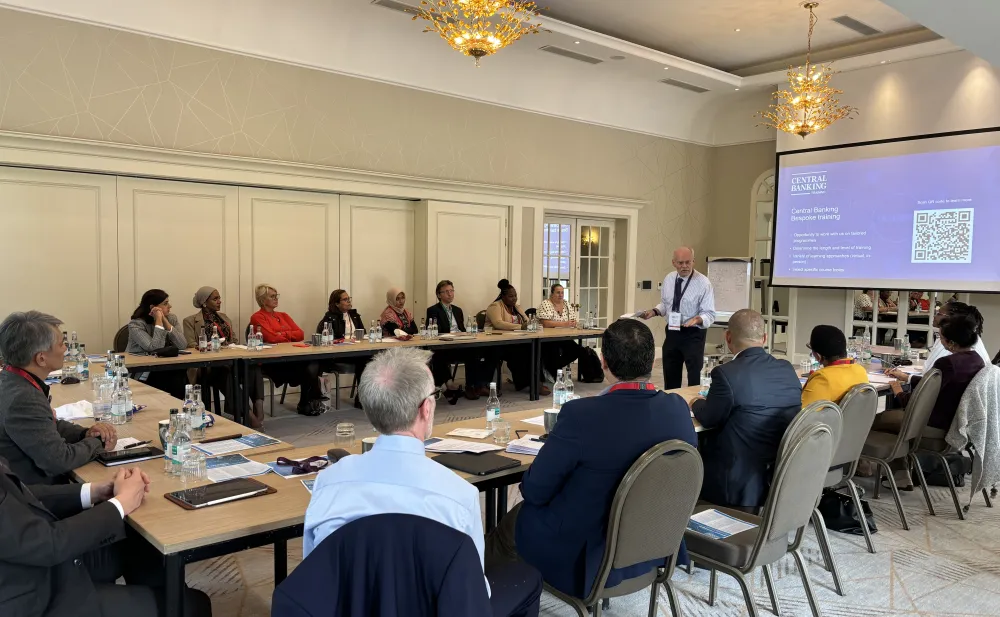
Learning outcomes
Download the brochure to view the learning outcomes.
Training venue
The training will be held in the heart of London at The Wellington Hotel.
If you wish to stay nearby the venue, please click the link here which will take you to a map of all the surrounding hotels.
Contact us

Interested in attending?
Jules Philippe-Auguste
Delegate Sales Executive Americas & Carribean
TEL: +1646-755-7269



